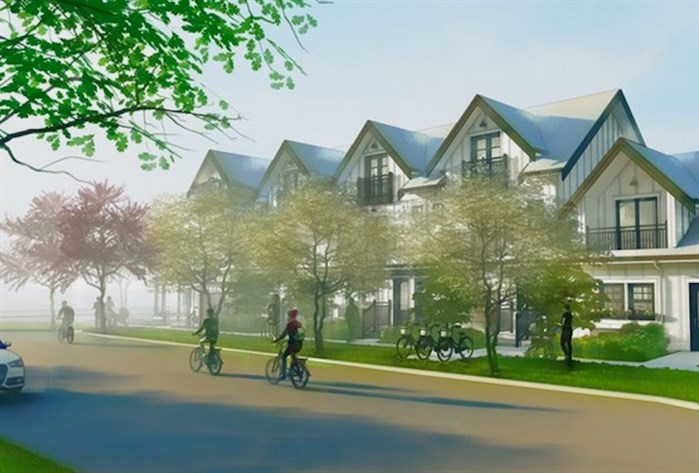New car-free housing in Victoria helps save money and the planet

An innovative housing plan can bring down the price of a newly built three-bedroom home by a “conservative” $50,000 to $100,000 simply by eliminating parking.
“We want to change people’s expectations around housing and transportation choices,” Julian West, owner of Victoria’s Urban Thrive, told iNFOnews.ca, Dec. 12. “Most of them just don’t have that choice today.”
He got rezoning approval at the end of November from the City of Saanich for a nine-unit, 2.5-storey building with no parking spots. He hopes to start building next summer.
West is also waiting to go to public hearing on a six-unit development in Victoria that also has no parking.
The Urban Thrive website explains by eliminating parking, it can build nine units where there would otherwise be six. That cuts the land cost to about $94,000 per home versus about $142,000.
“Parking is a huge trade-off,” West said.
It means not only more room for homes but more green space and landscaping on the same piece of land. The units will also pay a total of about $26,000 more a year in property taxes to help fund things like sidewalks and bus stops.
READ MORE: Kamloops, Kelowna could learn about housing affordability from this Lower Mainland city
A change like this doesn’t come easily.
The public hearing for the project took five hours with 125 pages of correspondence and 30 speakers, West said.
Most were in favour but there were still some opposed to the idea of denser housing in their neighbourhoods or who would not believe people could live without cars.
He has 70 families waitlisted for the homes, which shows a high level of interest just through word of mouth. It allows Urban Thrive to screen the applicants and choose people who are really committed to the car-free lifestyle. This can only happen in certain neighbourhoods where people can walk, cycle or take transit.
“The area is extraordinarily central,” West said. “The neighbourhood itself is sandwiched between Royal Jubilee Hospital and Camosun College, two major institutions, major employers. It’s a 12-minute bike ride to downtown, eight minutes by bus. There’s rec centres, all kinds of really high quality parks. There’s the Hillside mall not too far away. There’s a bunch of little urban malls. There’s just so many urban amenities.”
There will a large bike garage onsite and Modo car share programs in place.
“The car-free lifestyle is a lifestyle of short distances," the Urban Thrive website says. “Typically, you walk, bike and take transit for most trips and use a car-share vehicle on the occasions you need one. One or two trips a month is typical for Modo car-share members.
“It's also important to understand that it's much more than your life minus a car. It's a completely different lifestyle. You spend much more time within convenient walking and cycling distance and develop a rich connection and attachment to your local community.”
READ MORE: Small Island community might have answers to Kamloops, Okanagan housing crisis
Saanich has adopted a policy to reduce greenhouse gas emissions by 50% by 2030.
“Requiring parking and having that target just makes no sense,” West said. “It’s not a real commitment if your actions don’t meet your stated goals.”
He hopes the two projects serve as a model for many more to come and will show other cities what can be done to make housing both more affordable and better for the environment.
“Change is generally hard,” West said. “Municipalities are at the stage where they’re changing policies to match our climate goals There has to be some tough decisions and we need to do a better job of helping walk people along through that change, but it’s going to have to happen.”
West and a partner do other housing development in the Greater Victoria area through other companies. Those are geared to middle income buyers.
He’s also committed to having one car-free unit sell for 20% below market value.
To contact a reporter for this story, email Rob Munro or call 250-808-0143 or email the editor. You can also submit photos, videos or news tips to the newsroom and be entered to win a monthly prize draw.
We welcome your comments and opinions on our stories but play nice. We won't censor or delete comments unless they contain off-topic statements or links, unnecessary vulgarity, false facts, spam or obviously fake profiles. If you have any concerns about what you see in comments, email the editor in the link above.



